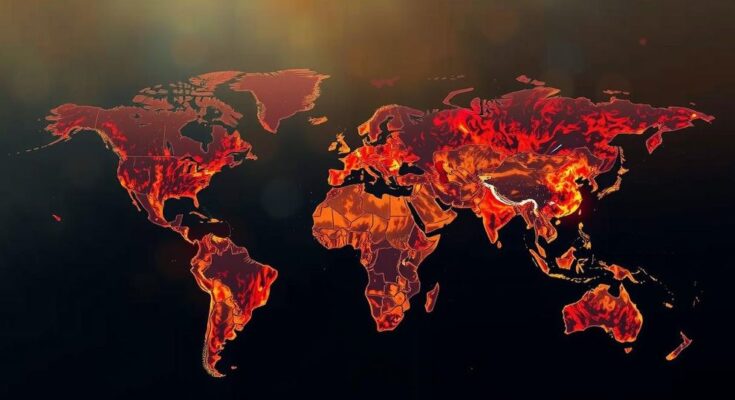Recent studies reveal that climate change significantly contributes to the rising frequency and intensity of wildfires worldwide, leading to an increase in smoke-related deaths from fewer than 669 annually in the 1960s to over 12,500 in the 2010s. Research highlights regional disparities; while wildfires have decreased in Africa, they have surged in regions like California and Siberia due to climate factors. Human interventions can mitigate some fire impacts but are often insufficient amidst extreme climate conditions.
Recent research has established a direct correlation between climate change and the escalating frequency and severity of wildfires globally. The studies, conducted by research teams from Dalhousie University, Belgium, the United Kingdom, and Japan, illuminate the adverse effects of wildfires on human health, particularly noting a significant rise in smoke-related fatalities over the past several decades. It is estimated that annual deaths attributable to wildfire smoke surged from fewer than 669 in the 1960s to approximately 12,566 by the 2010s. In one pivotal study published in the journal Nature Climate Change, researchers evaluated wildfire models with and without the influence of climate change, revealing a marked increase in the occurrence and intensity of wildfires in numerous regions, particularly in sensitive ecosystems such as the African savannas, Australia, and Siberia. However, findings also highlighted substantial regional disparities; while Africa, responsible for nearly 70 percent of the global burned area, experienced a decline in wildfires due to increased human activity and land fragmentation, areas like California and Siberia saw a significant uptick in fire events driven by prolonged droughts and elevated temperatures linked to climate change. Dr. Sian Kou-Giesbrecht, an associate professor at Dalhousie University and a co-author of both studies, emphasized the importance of these findings, noting their implications for society and the feedback loop they create with climate change. The research team utilized models incorporating diverse factors, including climate, vegetation, and population density. They underscored that while human interventions such as fire suppression and landscape management can mitigate wildfire effects, they often fail to counteract the overwhelming influence of climate change, particularly during extreme weather conditions. As noted by climate scientist Seppe Lampe from Vrije Universiteit Brussel, “What is striking is that in periods with low to moderate numbers of fires, direct human interventions have a large effect. However, in periods with many fires, the effect of climate change dominates, meaning that in these cases we lose control.” The simulations indicated that climate change augmented global burned area by nearly 16 percent between 2003 and 2019, alongside a 22 percent increase in the probability of experiencing months with above-average burned areas. A separate analysis also revealed that climate change may have amplified the proportion of wildfire smoke-related deaths tenfold over the past 50 years, a previously unquantified phenomenon. This study identified South America, Australia, Europe, and the boreal forests of Asia as regions with the highest mortality rates due to wildfire smoke. Dr. Kou-Giesbrecht articulated the challenges of attributing wildfire events to climate change, given the intricate interactions involved. However, she asserted that their efforts yielded robust evidence linking wildfires to climate change across multiple models. She cautioned that if the current trajectory of climate change persists, the area of burned land and associated health hazards will escalate significantly in the forthcoming decades.
The increasing incidence and severity of wildfires is a pressing concern linked to climate change. As global temperatures rise and extreme weather becomes more prevalent, understanding the relationship between climate change and wildfires is essential for public health and environmental strategy. Various studies have sought to quantify the impacts of climate change on wildfires and the resultant health implications, particularly concerning smoke-related mortality. This body of research sheds light on regional variations in wildfire behavior and the effectiveness of human interventions in mitigating fire risks amidst climate shifts.
The studies conducted underscore the significant impact of climate change on the rising frequency and intensity of wildfires worldwide, particularly emphasizing their adverse effects on human health through increasing smoke-related fatalities. Despite some success in mitigating wildfires through human interventions, the overwhelming influence of climate change remains a dominant factor, especially during periods of extreme weather. Immediate and sustained reductions in greenhouse gas emissions, alongside strategic landscape and fire management, are imperative to manage the escalating threat of wildfires and their impacts on society and ecosystems.
Original Source: www.dal.ca




